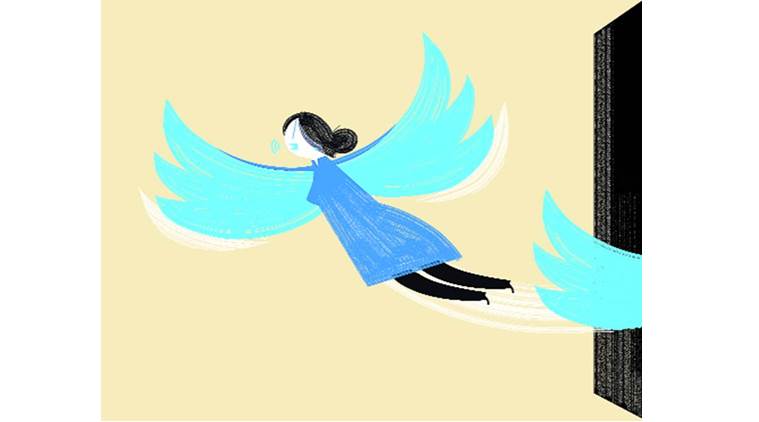The inevitability of MeToo
The global movement is the unfinished business of the 21st century

Today, the #MeToo revolution is about breaking the silence. Illustration by CR Sasi Kumar
The #MeToo revolution is on the way. It is certainly a revolution, not only because it is changing structural habits in a male-dominated world, but it is also, as Hannah Arendt says, the only political event which confronts us directly and inevitably with the problem of beginning. Thus, according to Arendt, acting precisely entails the event of beginning something new and unique, which is the foundation of our freedom. Acting in view of freedom always announces a new mode of thinking and a new mode of being. This is not a capacity to choose between different options, but the capacity to begin something novel and having the ability to do the unexpected. However, this capacity to create a new beginning is itself dependent on the plurality of others.
Consequently, plurality entails both likeness and otherness, since we all belong to the same species and we have the mental capacity to comprehend each other. It is this capacity to understand each other that engenders empathy and compassion, but also disgust and rejection. Now, since the #MeToo movement is about structural changes in social and political mentalities, it cannot look at all men as potential rapists, molesters and homophobics. Quite the opposite, if the #MeToo movement is concerned with the art of re-organising our societies, then the other is not necessarily a “male” but primarily a “citizen”. While the urgency of women’s liberation and gender equity does not seem to be the same for all, the cause of freedom is universal.
If we go back to the history of feminism, we can see that women’s struggle for emancipation has always been a quest for autonomy and equity accompanied by a strong sense of questioning of the social and political structures of a male-dominated modernity. This process of critical questioning of the sexual and the political became crucial and essential at every period of modern history where the male political power was put on hold by a revolution (French Revolution) or a major social movement (May 1968).
However, despite numerous successes exemplified by the efforts of women in the past hundred years, the modern idea of the “republic”, as elaborated by the American and French revolutions, continues to be perceived and practised on the basis of a sexual division of roles and spaces. As such, the public space is essentially thought and instrumentalised as a masculine space, while the private space is considered as primarily feminine. Thus, the res publicae (public affairs) has been essentially conquered and dominated by men, while women have been, generally, pushed back to the private space and defined as “mothers”, “sisters” and “wives”.
In other words, in many cultures of the world, women are still to be protected in the private sphere, instead of making use of their reason in the public space. Therefore, what Immanuel Kant understood from the general motto of the Enlightenment: “Have the courage to use your own understanding” still applies, from the point of view of many of our contemporaries, uniquely to men and not women. That is why, until very recently, to be a virtuous woman meant to be a speechless and inactive citizen in the public domain. A common attitude among many men is: “Women have the right to work wherever they want, as long as they have the dinner ready when you get home” (John Wayne).
Accordingly, a general view in many male-dominated societies of our time is that a woman who speaks openly and frankly in the public domain dishonours herself or more precisely disgraces her family and her community. Despite all this, the time for change has come. Beyond all social and political cleavages, feminism is the inevitable philosophy of the 21st century.
Today, the #MeToo revolution is about breaking the silence. In other words, a woman who dares to think and to act otherwise is the one by whom the scandal arrives. As Balzac says, “Every person who thinks strongly creates a scandal.” The scandal in question is a collective object, because it includes not only the one who dares to break the taboo, but also those who try to prevent her from acting rebelliously. Not surprisingly, feminism has always been scandalous, either as a mode of thinking or a mode of acting. However, no other person as Simone de Beauvoir, and no other book as The Second Sex, have ever been at the heart of the cultural and political struggles of women against conservatism and conformism in our contemporary societies.
The Second Sex, published in 1949, became one of the most celebrated and contested books of the 20th century. The scandal around this book was not only that it had been written by a woman-philosopher, who had the courage to question the values of the male chauvinistic society of her time, but also because it mainly redefined womanhood as a social creation and not a given fact of nature. Famously declaring that “one is not born a woman, one becomes one”, Beauvoir challenged the constraints that the essentialist social practices imposed on human society. The imperative that Beauvoir suggested was based on the desire, choice and commitment to transform a world dictated by the exigencies of men. Not too many women before Beauvoir had linked the questions of female sexuality to political issues. The Second Sex radically changed the whole manner of looking at the condition of women. Beauvoir gave a history to women which, for once, was not written by men. It was a perpetual lesson of freedom that at least three generations of feminists continued to rethink and relive around the world.
Seventy years after The Second Sex, the #MeToo global movement, championing other women around the world against the arrogant and dominating attitude of men, is the unfinished business of the 21st century. But the truth is one cannot be a feminist today without looking back at Simone de Beauvoir’s audacity to think dangerously. The promise of freedom and equity, as Beauvoir underlined it, has never been an individual achievement, but an ongoing collective task whose challenges and sufferings we must take up together. As Beauvoir says: “We see that no existence can be validly fulfilled if it is limited to itself.”
The writer is professor and vice-dean at Jindal Global University
For all the latest Opinion News, download Indian Express App
More From Ramin Jahanbegloo
- Iran on the edgeUS sanctions have pushed the country’s economy to the brink...
- Iran BesiegedUS has eschewed diplomatic solutions. Sanctions could cripple Tehran..
- The West Asia StalemateOn the Iran nuclear deal, players lack the moves to deal with a vexed issue..








































No hay comentarios:
Publicar un comentario